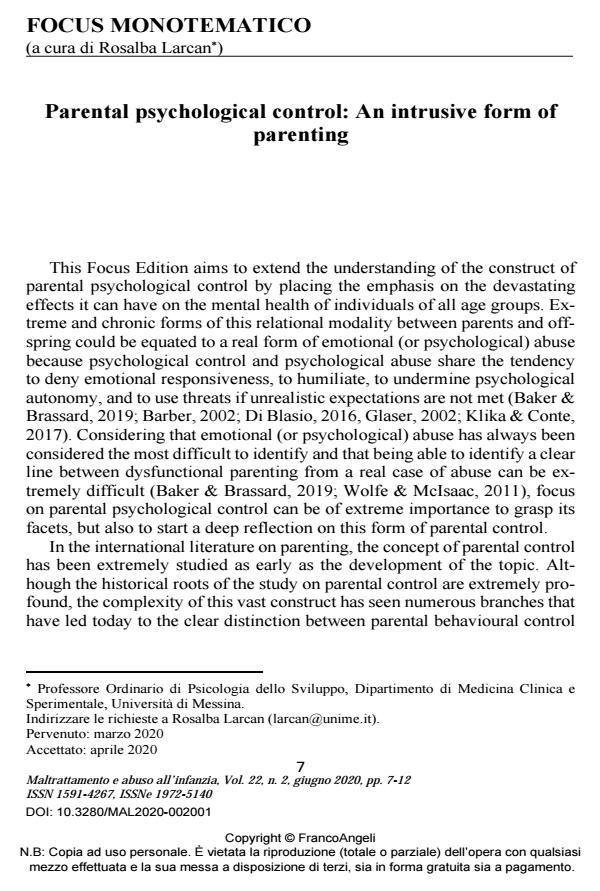Parental psychological control: An intrusive form of parenting
Titolo Rivista MALTRATTAMENTO E ABUSO ALL’INFANZIA
Autori/Curatori Rosalba Larcan
Anno di pubblicazione 2020 Fascicolo 2020/2
Lingua Inglese Numero pagine 6 P. 7-12 Dimensione file 175 KB
DOI 10.3280/MAL2020-002001
Il DOI è il codice a barre della proprietà intellettuale: per saperne di più
clicca qui
Qui sotto puoi vedere in anteprima la prima pagina di questo articolo.
Se questo articolo ti interessa, lo puoi acquistare (e scaricare in formato pdf) seguendo le facili indicazioni per acquistare il download credit. Acquista Download Credits per scaricare questo Articolo in formato PDF

FrancoAngeli è membro della Publishers International Linking Association, Inc (PILA)associazione indipendente e non profit per facilitare (attraverso i servizi tecnologici implementati da CrossRef.org) l’accesso degli studiosi ai contenuti digitali nelle pubblicazioni professionali e scientifiche
- Stattin, H., & Kerr, M. (2000). Parental monitoring: A reinterpretation. Child development, 71(4), 1072-1085, DOI: 10.1111/1467-8624.00210
- Baker, A. J., & Brassard, M. (2019). Predictors of variation in sate reported rates of psychological maltreatment: A survey of statutes and a call for change. Child abuse & neglect, 96, 104-102.
- Barber, B. K. (1992). Family, personality, and adolescent problem behaviors. Journal of Marriage and the Family, 69-79. DOI: 10.2307/353276
- Barber, B. K. (1996). Parental psychological control: Revisiting a neglected construct. Child development, 67(6), 3296-3319,
- Barber, B. K. (2002). Intrusive parenting: How psychological control affects children and adolescents (pp. xv-309). American Psychological Association.
- Barber, B. K., & Harmon, E. L. (2002). Violating the self: Parental psychological control of children and adolescents. In B. K. Barber (Ed.), Intrusive parenting: How psychological control affects children and adolescents (p. 15-52). American Psychological Association, DOI: 10.1037/10422-002
- Di Blasio, P. (2016). Forme di violenza e conseguenze psicologiche. Maltrattamento e Abuso all’Infanzia, 18(2), 4-15, DOI: 10.3280/MAL2016-S02001
- Dishion, T. J., & McMahon, R. J. (1998). Parental monitoring and the prevention of child and adolescent problem behavior: A conceptual and empirical formulation. Clinical child and family psychology review, 1(1), 61-75, DOI: 10.1023/A:1021800432380
- Fortson, B. L., Klevens, J., Merrick, M. T., Gilbert, L. K., & Alexander, S. P. (2016). Preventing child abuse and neglect: A technical package for policy, norm, and programmatic activities. Atlanta, GA: National Center for Injury Prevention and Control, Centers for Disease Control and Prevention.
- Glaser, D. (2002). Emotional abuse and neglect (psychological maltreatment): A conceptual framework. Child Abuse & Neglect, 26(6-7), 697-714,
- Grolnick, W. S. (2003). The psychology of parental control: How well-meant parenting backfires. New York: Psychology Press.
- MacKinnon, D. W. (1938). Violation of prohibitions. In H. A. Murray (Ed.), Explorations in personality: A clinical and experimental study of fifty men of college age (pp. 491- 501). New York: Oxford University Press.
- Ryan, R. M., & Deci, E. L. (2017). Self-determination theory: Basic psychological needs in motivation, development, and wellness. New York: Guilford Publications.
- Schaefer, E. S. (1959). A circumplex model for maternal behavior. Journal of Abnormal and Social Psychology, 59, 226-235,
- Schaefer, E. S. (1965a). Children’s reports of parental behavior: An inventory. Child Development, 36, 413-424, DOI: 10.2307/1126465
- Schaefer, E. S. (1965b). A configurational analysis of children’s reports of parent behavior. Journal of Consulting Psychology, 29, 552-557,
- Scharf, M., & Goldner, L. (2018). “If you really love me, you will do/be…”: Parental psychological control and its implications for children’s adjustment. Developmental Review, 49, 16-30,
- Soenens, B., & Vansteenkiste, M. (2010). A theoretical upgrade of the concept of parental psychological control: Proposing new insights on the basis of self-determination theory. Developmental Review, 30(1), 74-99,
- Steinberg, L. (1990). Autonomy, conflict, and harmony in the family relationship. In S. S. Feldman & G. R. Elliott (Eds.), At the threshold: The developing adolescent (p. 255-276). Harvard University Press.
- Symeou, M., & Georgiou, S. (2017). Externalizing and internalizing behaviours in adolescence, and the importance of parental behavioural and psychological control practices. Journal of adolescence, 60, 104-113,
- Valtolina, G. G. (2013). Contesto culturale, controllo genitoriale e punizioni fisiche. Maltrattamento e Abuso all’Infanzia, 15(1), 11-25, DOI: 10.3280/MAL2013-001002
- Vansteenkiste, M., & Ryan, R. M. (2013). On psychological growth and vulnerability: Basic psychological need satisfaction and need frustration as a unifying principle. Journal of psychotherapy integration, 23(3), 263,
- Verrocchio, M. C. (2014). Il maltrattamento psicologico: caratteristiche e conseguenze. Maltrattamento e Abuso all’Infanzia, 16(1), 11-35, DOI: 10.3280/MAL2014-001002
- Wolfe, D. A., & McIsaac, C. (2011). Distinguishing between poor/dysfunctional parenting and child emotional maltreatment. Child Abuse & Neglect, 35(10), 802-813,
- Parental psychological control and school engagement in adolescents: A longitudinal study Federica Papa, Francesco Preiti, Sebastiano Costa, in MALTRATTAMENTO E ABUSO ALL'INFANZIA 3/2024 pp.61
DOI: 10.3280/MAL2024-003003 - Parental Psychological Control in Childhood: A Systematic Review based on Self-Determination Theory Francesca Liga, Martina Gallo, Francesca Cuzzocrea, in MALTRATTAMENTO E ABUSO ALL'INFANZIA 3/2024 pp.13
DOI: 10.3280/MAL2024-003002 - Dallo stress economico al malessere psicologico dei minori durante la pandemia da Covid-19: quale ruolo per il conflitto co-genitoriale e le pratiche educative autoritarie? Elena Camisasca, Venusia Covelli, Sarah Miragoli, in MALTRATTAMENTO E ABUSO ALL'INFANZIA 1/2021 pp.13
DOI: 10.3280/MAL2021-001002
Rosalba Larcan, Parental psychological control: An intrusive form of parenting in "MALTRATTAMENTO E ABUSO ALL’INFANZIA" 2/2020, pp 7-12, DOI: 10.3280/MAL2020-002001